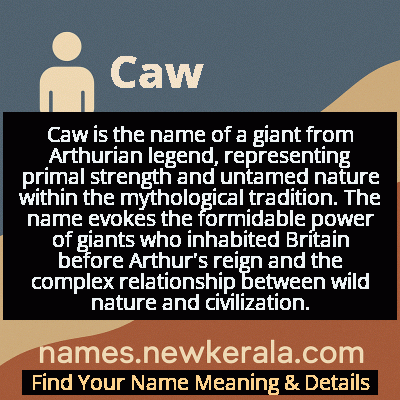Caw Name Meaning & Details
Origin, Popularity, Numerology Analysis & Name Meaning of Caw
Discover the origin, meaning, and cultural significance of the name CAW. Delve into its historical roots and explore the lasting impact it has had on communities and traditions.
Name
Caw
Gender
Male
Origin
Arthurian
Lucky Number
9
Meaning of the Name - Caw
Caw is the name of a giant from Arthurian legend, representing primal strength and untamed nature within the mythological tradition. The name evokes the formidable power of giants who inhabited Britain before Arthur's reign and the complex relationship between wild nature and civilization.
Caw - Complete Numerology Analysis
Your Numerology Number
Based on Pythagorean Numerology System
Ruling Planet
Mars
Positive Nature
Generous, passionate, energetic, and humanitarian.
Negative Traits
Impulsive, impatient, moody, and can be overly emotional.
Lucky Colours
Red, maroon, scarlet.
Lucky Days
Tuesday.
Lucky Stones
Red coral, garnet.
Harmony Numbers
1, 2, 3, 6.
Best Suited Professions
Military, sports, philanthropy, leadership roles.
What People Like About You
Courage, energy, leadership, generosity.
Famous People Named Caw
Caw of Prydyn
Arthurian Giant
Father of numerous children who became knights of Arthur's court
Caw the Giant
Mythological Figure
Prominent figure in Welsh mythology and Arthurian cycles
Caw of Scotland
Legendary Chieftain
Ruler mentioned in early British histories and genealogies
Name Variations & International Equivalents
Click on blue names to explore their detailed meanings. Gray names with will be available soon.
Cultural & Historical Significance
As a giant figure, Caw symbolizes the primal forces that the Arthurian order sought to overcome, yet his children's integration into Arthur's court shows the complex relationship between the old Celtic world and the new Christian chivalric order. This duality makes Caw an important transitional figure in the Arthurian cycle, representing both the challenges facing the new kingdom and the potential for reconciliation between different cultural traditions. His legacy in Welsh literature ensures his continued importance in understanding the development of Arthurian mythology from its Celtic roots.
Extended Personality Analysis
As a giant from Arthurian legend, the name Caw evokes traits of immense physical strength, primal power, and formidable presence. Giants in medieval literature often represent untamed nature and raw, uncontrolled force, suggesting that someone named Caw might be perceived as possessing great inner strength and determination. The association with giants also implies a certain isolation or otherness, as giants typically dwell in remote areas and operate outside conventional society, potentially indicating independence and self-reliance.
However, Caw's specific role as a father to Arthurian knights adds complexity to these traits, indicating potential for nobility, protective instincts, and the capacity to bridge different worlds. This suggests a personality that combines raw power with paternal wisdom and the ability to produce heirs who integrate into civilized society. The name might imply someone who is both formidable and nurturing, capable of great strength but also concerned with legacy and the success of future generations. This combination of primal power and familial responsibility creates a rich psychological profile rooted in mythological archetypes.
Modern Usage & Popularity
The name Caw remains extremely rare in modern times, primarily appearing in historical or literary contexts rather than as a given name. Its usage is almost exclusively confined to academic discussions of Arthurian legend, Celtic mythology, or as a character name in fantasy literature and games drawing from Arthurian sources. The name has never appeared in modern baby name registries or popularity charts, maintaining its status as a purely literary and historical name. Contemporary usage would likely be limited to parents with deep interests in Arthurian lore or Celtic mythology seeking a truly unique name with strong mythological connections, though its brevity and distinctive sound might appeal to those looking for short, powerful names outside mainstream trends.
Symbolic & Spiritual Meanings
Symbolically, Caw represents primal strength, untamed nature, and the wild aspects of the British landscape that civilization must contend with. The name evokes images of ancient power, mountainous terrain, and the formidable forces that heroes must overcome. As a giant who bridges the Celtic and Arthurian worlds through his children, Caw also symbolizes transformation and integration—the raw power of nature being channeled into civilized society. The onomatopoeic quality of the name, reminiscent of a crow's call, adds layers of meaning related to prophecy, intelligence, and the connection between the human and animal worlds. In broader symbolic terms, Caw embodies the tension between chaos and order, wilderness and civilization, that characterizes much of Arthurian literature, making him a powerful symbol of the challenges inherent in building and maintaining a just society.

